Chandra’s Origin: Fire Logic
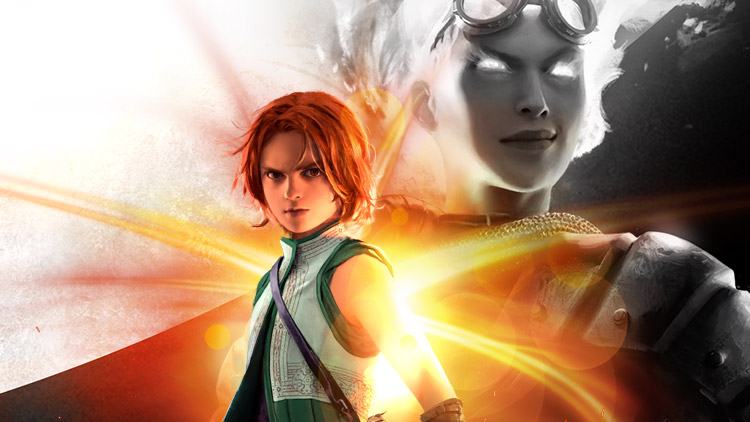
Art by Chase Stone
City of Ghirapur, Plane of Kaladesh
Eleven-year-old Chandra Nalaar climbed through a shower of sparks. One or both of her parents were welding somewhere up the mine shaft from her and she grinned as the little flecks of fire bounced off her red hair. She climbed hand-over-hand up the web of scaffolding that clung to the walls of the tunnel. Today was finally the day. Her parents were inventors, her grandparents had been inventors, ancestors throughout Chandra’s family had been inventors. Today was the day she would finally embrace what had always been her chosen destiny: to become a deliverer of canisters.
Inventing had never been her strong point.
It wasn’t that she didn’t appreciate devices. Her world was full of wondrous inventions and marvels of clicking, gear-driven artificial life. It was just that somehow her patience seemed to end sometime before her projects did. And somehow, sometime during the construction phase, her fist almost invariably wound up colliding with the face of someone who deserved it.
It was a personal failing. She accepted it.
She had tried other callings. She set her mind to becoming a master artist, and had a roomful of snapped paintbrushes and ripped canvases to prove it. She had tried applying herself to schoolwork, until she was sent home with bruised knuckles and a headmaster’s note. She had never quite found her place in a world governed by clockwork and consuls. But today her true calling would begin.
Maybe Chandra would never be a metalsmith like her father or an ingenious artisan like her mother, but in a world that ran on elegant machines, she could supply the power source—the mystical Æther—to those who needed it. The supply of Æther was tightly controlled by the consuls, but her parents knew ways of procuring it, and they always helped those who needed fuel for their inventive passions.
Chandra clambered over the railing onto the platform where her father was at work on one of his own metallic creations. He pushed his thick-lensed goggles up on his head, leaving a raccoon mask of clean skin around his eyes. “Chandra! Haven't I told you to keep inside the safety railing? Why did I even build that thing?”
“It makes a much better ladder,” Chandra said. She hugged his waist. “So. Father dearest. I’m ready to go. Did you know that I’m ready to go? I’m informing you now. Ready.”
Her father rolled his eyes. “I’m not going to try to instill the virtue of patience in you. But I’m not the one to talk to. Your mother has it.”
Her mother clanked down a tight coil of stairs, wearing heavy gloves and an embroidered shawl around her hips. She carried a metal canister with all the ceremony of a birthday cake. “Her inaugural solo delivery! Oh, just look at her, Kiran! She’s going to burst. Here, daughter, come and help me seal this before the shipment explodes—or you do.”
Chandra’s mother set down the canister. The lid shimmered and hissed with a thin jet of effervescent vapor. In the same time it took for her father to gasp a word—“Careful!”—Chandra had given the canister a swift kick with her boot. The lid dented in, but it stopped hissing. Chandra grinned.
“I can tell already you’re going to be the best courier this city has ever seen,” said her mother with a wink.
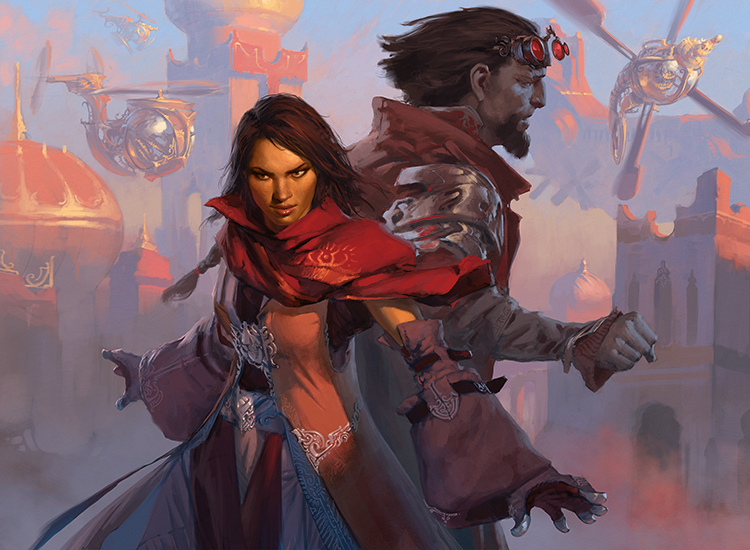
Art by Tyler Jacobson
Chandra tipped her chin up like mock royalty. “Please prepare all my medals and trophies for when I return. I’ll try to remember you all when I am the world’s most important outlaw.”
“We prefer ‘vehicles of grassroots change,’” her father said. “But this is a serious responsibility, Chandra. The consuls have been stepping up patrols. People need what we can provide, but if we bring them trouble they will turn against our cause. Your mother and I are reaching out to find people we can trust.”
Chandra took the canister into her satchel and slung it on her back. “And today we’re trusting the old lady who lives by the Foundry.”
“Mrs. Pashiri, yes,” said her father.
“She was always fond of you,” said her mother. “Remember, she’ll know the signal. Those who know the signal know us for who we truly are.”
“I already know who I am. Chandra, the World’s Finest Courier.”
Her mother gave her an awkward hug, patting the canister on her back. “Your father and I believe in you. You know the route. You know the city. You’ll do great.”
“Just be sure no one follows you back here,” added her father, but Chandra was already climbing.
The sun dazzled her eyes. The city of Ghirapur moved like a living thing, the architecture adapting to the needs of the gearcrafters, thopter-builders, clockforgers, and other inventors and artisans who swarmed through it. Chandra struggled her way through the crowd, pulling on a school tunic with her teeth, the canister clanking against her back.
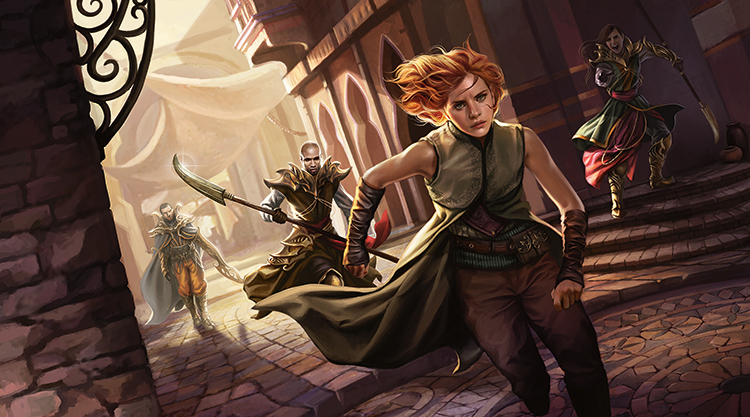
Art by Magali Villeneuve
The thoroughfare was jammed with too many people. She made a decision and took a perpendicular turn toward the canal. Two halves of a bridge glided to meet each other with a series of metallic clicks, merging to become a span over the canal, and Chandra hopped over the gap before it had completely come together. She diagonaled through the gates of the Akhara, a huge, round plaza ringed with tiered seats, skipping across the gears that rotated in the pavement and the raised dais in the center, dodging a clique of jabbering Ætherologists.
She took two more out-of-the-way turns and stopped at a baked-clay wall inlaid with vibrant mosaic tile portraits of great inventors. The surface was sheer and smooth, but she put her boot into a notch above one inventor’s nose and clambered over, dropping down onto a pathway painted with slashing stripes.
When she hit the ground, a group of soldiers, straight-backed and clean-cut, stood in her path: consuls’ forces. They wore standard-issue snapblades strapped to their forearms, and one had an Æther-charged dart-thrower.
“Where are you off to, young one?” one of them asked. “This is a restricted corridor.” He noted Chandra’s uniform, a replica of the ones some kids wore to the Builder’s Institute. “Shouldn’t you be in school?”
“I’m in a hurry,” said Chandra. “And my examiner will eat me alive if I’m late again, so if you’ll excuse me…”
“As I’m sure you’re aware, miss, this is a restricted corridor,” said a second soldier. The snapblade clicked out from his forearm mount, its edge glittering. “The thoroughfare for pedestrians is back on the other side of the courtyard.”
“And the school bell already rang,” said the first soldier. “You sure you’re a student?”
“You wouldn’t be transporting illegal goods, would you?”
“Hand over the bag, please.”
Prickly heat crossed Chandra's brow. She couldn’t dodge past them, and she couldn’t exactly make a run for it.
“If I get another demerit, I’m done,” she said, glancing from the soldier’s gleaming blade up into his eyes. “Can’t you just let me go?”
One of them nodded to the other one. “Get out the Æther detector.”
Chandra shifted her weight away from the one who’d seized her, then jabbed sideways, elbowing another of the soldiers in the gut. She rebounded and slammed her fist into the collarbone of the first. That was probably a bad idea, she thought an instant after having done it. Such was fist logic.
The soldiers collapsed on her like a trap. Their hands took hers behind her back, so that she could only look down at the street. She kicked one in the shins and tried to head-butt one in the chest, but she couldn’t get free. A flood of heat and fury washed through her, and she clenched her teeth.
The soldiers halted. Another set of feet approached.
“Captain Baral,” one of the soldiers said.
Chandra wrestled to her feet and looked up at him. Captain Baral was a monolith of a man, stout and statuesque, with a face that seemed to taunt those around it for being of lesser handsomeness. The other soldiers stood silently.
“What’s the problem here?” he asked, looking at Chandra but not addressing her, his voice a gravelly whisper.
“Uncooperative, sir. A possible truant.”
“We told her this wasn’t the thoroughfare for pedestrians.”
Captain Baral smirked down at her. “You have to use small words with these street children,” he whispered. “Simple commands. ‘Sit.’ ‘Stay.’”
Chandra’s hands squeezed into fists. Rage spread through her fast, like a lit box of matches, igniting all the nerves in her body. Heat spread down her arms, into her hands, still held behind her back.
“I know you’re not a student,” said Baral. “Slide the bag off your shoulders and hand it to me.”
“No.”
“I don’t think you understand, child. You’re already in violation of the law in a half-dozen ways. Comply, or I will make you comply.” He put his hand on Chandra’s shoulder—gently, but with no tenderness in it. It was a clinical touch, somehow revolting in its cold detachment.
Chandra’s muscles tensed and she jerked away, making a sound through her teeth. She wanted to lash out, to yell, to throw her fury out at him.
And then something happened that had never happened to her before. Her hands glowed from within, illuminating the bones and blood vessels and the lines in her palms. Growing in intensity, the heat erupted through her skin until her hands were engulfed with fire like two torches. Chandra yelped in shock and stood there, dazzled, looking back and forth between her hands as they burned.
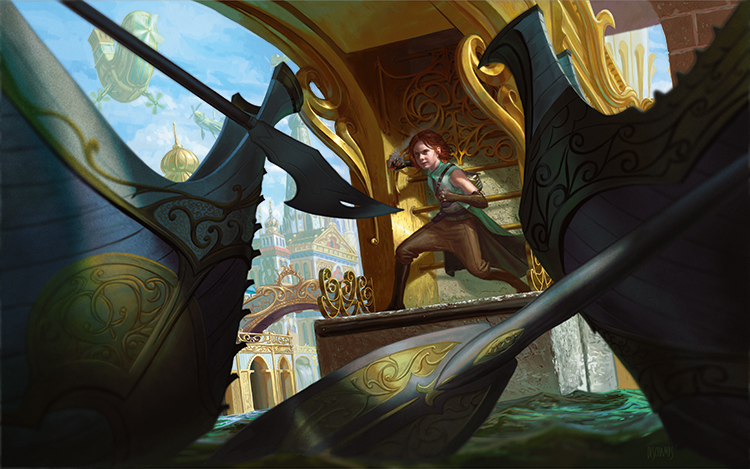
Art by Eric Deschamps
The soldiers backed away in a semicircle. Captain Baral stood still, surprise turning to genuine interest.
Chandra shook her hands. They didn’t go out. She thought about patting them against herself, but thought better of it. She looked to the men, too upset for words, gesturing with her burning hands. Strangely, her skin was not burning. The flames enveloped her hands, but there was no pain.
Baral put his hand out to her again. “Let me help you with that, child.”
“Get back!” Chandra instinctively waved away the aggressor, creating a blazing arc of fire in the air. The men backed away. The fire evaporated, and for a moment, everyone just blinked.
Chandra burst into a run. She slipped between two of the soldiers, both of whom made an inadequate half-motion to stop her, and she was gone. Behind her, she heard Baral’s gravel-throated whisper become a growl. “I want whirlers after her. Now.”
Chandra took a series of turns through the streets, leaving the consuls’ soldiers and a tangle of bewildering emotions behind her. She kept glancing down at her hands, but they appeared to be nothing but hands now. There was no sign of the self-immolating craziness from moments before. It wasn’t that she hadn’t seen magic before; inventors regularly built creations that defied explanation, made even more wondrous by the power of Æther. But conjuring fire without the use of a device—that was new to her.
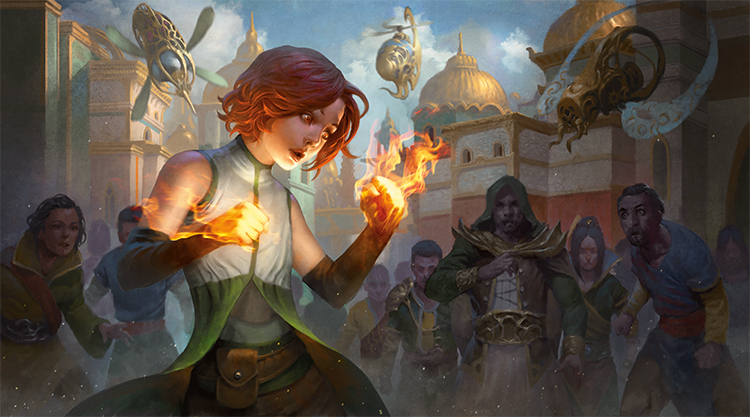
Art by Lius Lasahido
She ran onto a bridge back in the direction of home, but froze midway across. Rising almost silently into view were three ornate flying roterothopters, beating the air with their spinning rotors, each one with a large lens staring right at her.
She still had the canister. She wasn’t sure whether she was still eligible for the World’s Finest Courier Award at this point—she wondered if there was an award for Worst—and most of all she wanted badly to run home. But that would lead the whirlers there, directly to her family. The flying spies would report on all of her parents’ activities, and she was sure Captain Baral would come for them. She wasn’t sure what the punishment was for trafficking in Æther supplies. But she had heard stories of harsh and painful sentences carried out in the Akhara, in front of crowds of people.
The whirlers dipped and swung through the air toward her, staying just behind her as she fled back across the bridge. It was hard to escape on foot something that flew; the whirlers rose easily over obstacles she had to run around and she had to keep checking what was directly in front of her. She ducked into narrow alleys and dashed through shops, but the whirlers nimbly curved around to meet her when she came out the other side.
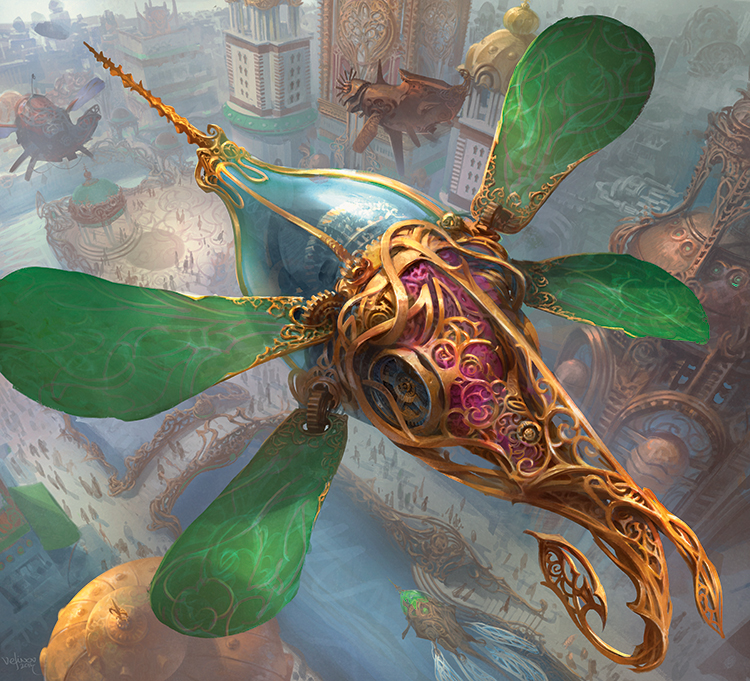
Art by Svetlin Velinov
She approached a familiar spire: the Consuls’ Foundry, the Æther-powered factory that mass-produced automatons for the consuls. She was about to circle around it and head deeper into the city when she heard her name.
“Chandra?” It was Mrs. Pashiri, Chandra's contact and a friend of the Nalaar family. She was emerging from the main doors of the Foundry, a set of keys in her hand.
“Mrs. Pashiri!” cried Chandra, out of breath.
“What’s wrong, dear? We weren’t supposed to meet here.”
“They’re after me,” Chandra said, pointing over her shoulder at the oncoming whirlers. Then she hesitated, remembering her parents’ warnings of whom to trust, and eyeing the ring of keys to the Consuls’ Foundry. On reflex, her fists tightened.
But Mrs. Pashiri made a loop with her forefinger and thumb, and held them near her forehead, as if she were pushing up a pair of goggles. It matched the signal Chandra’s parents had shown her. When Mrs. Pashiri made the gesture, she made it with reverence, almost a salute. “The Nalaars and I go way back, child,” she said.
Chandra vacillated. She could hear the whirlers’ approach. She wanted to trust her contact, this family friend who knew the right gesture, but the set of keys meant some kind of connection to the consuls. Options spun around her.
Mrs. Pashiri’s eyes narrowed as she looked past Chandra and saw the whirlers. She turned and unlocked the Foundry door again. “Get in here. Go out the back. I’ll distract them.”
It was the last place Chandra would have chosen to enter. As she debated, Mrs. Pashiri produced a delicate copper bird from her tunic. The bird came to life, fluttering its feather-etched wings, and launched toward the whirlers. The copper bird collided with one of the whirlers and exploded, sending a shower of pieces down to the street.
“Get inside,” said Mrs. Pashiri with a sharp nod, producing a little bat of silver filigree. “The machinists aren’t in yet. Go, dear. Get to safety.”
Chandra ran inside as Mrs. Pashiri began yelling insults at the whirlers.
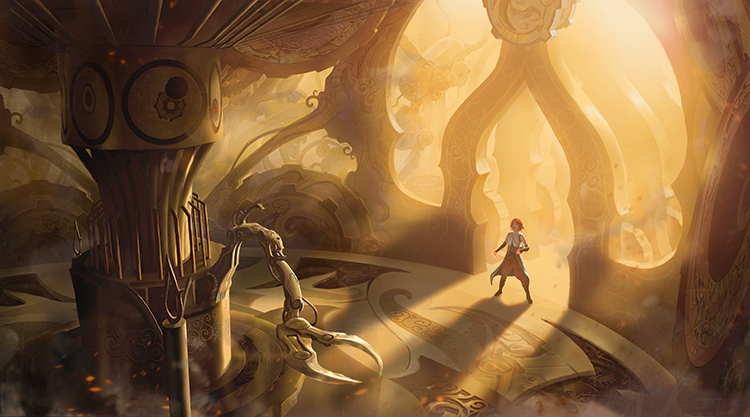
Art by Johann Bodin
The interior of the Foundry was a still life of silent machinery. Half-assembled automata hung motionless, suspended by their torsos at machinists’ stations. Legs and grippers stood in racks, waiting for their turn to be riveted together and become another mass-produced servitor. The main overhead lamps were dark, and the only light was from a round glass skylight in the domed ceiling. A huge pylon, planted in the center of the space, soared up to the top of the dome. Automatic arms and gear-driven manipulators were folded against the pylon like a duck’s wings.
Chandra crept between assembly stations and filigreed gears, looking for the other exit. She heard another small explosion outside, and Mrs. Pashiri’s invectives faded into the distance. Chandra heaved a full-chested sigh of gratitude for the distraction.
She heard a ticking sound high above. Up on the ceiling, a series of elegant gears turned, and the skylight swiveled open. An unmistakable whisper of rotors heralded the last whirler, which descended through the skylight and found her with its eye.
A series of orange lamps flickered on across the foundry ceiling, cascading to life in a spiral pattern. The arms of the pylon stirred, splaying out its surprisingly long limbs and clawlike grippers. All around the foundry floor, artifact creatures unhitched themselves from their mountings and pivoted their heads toward her under the lurid light of the lamps.
A surge of heat flooded through her body. Her hands tingled and began to glow.
“No, thank you,” she said to her hands. “Not again. No, no, no.”
She pushed past one small artifact creature and elbowed another out of the way. She spied the exit, but a huge, six-legged machine stepped in the way of it. She turned back to the entrance, but that way looked even worse. Automata came out of nowhere, striding or shuffling for her.
A gear-driven humanoid construct reached out to her. Instead of hands it had metal shackles, and it reached for her wrists with its fetter-claws. She punched it, because that was fist logic. But instead of connecting, her fist threw a blast of fire, knocking back the construct and smashing it into scorched pieces on the ground. Another artifact creature crept at her and she fire-punched it too, flame erupting out of her at the point of impact. Her hands bloomed with fire again. These were beautiful machines, and she was in no way in control of her fire skill, but there was no time to stop and think. She raged forward with a progression of shouts and blows, scorching her intricate assailants one by one as they surrounded her.
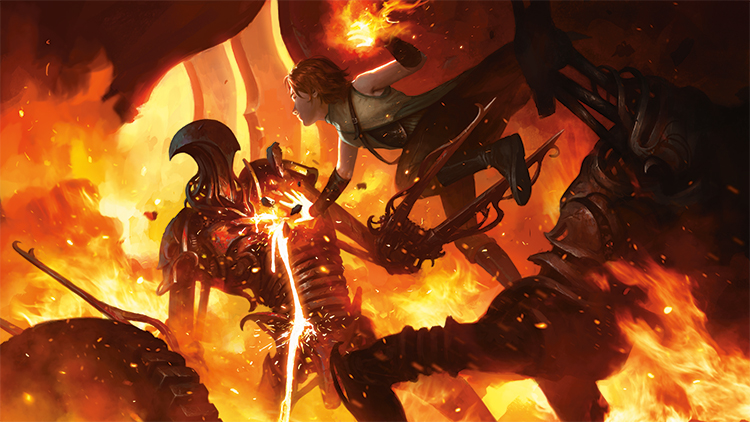
Art by Daarken
She tried to cut her way to the rear exit but the horde of Foundry servitors came at her too fast, and the big, six-legged monstrosity still stood guard at the door. The whirler even had the audacity to swing low, sprout a bladed claw, and nip at her back.
She whipped around and yelled at it. Its rotor blades somehow caught fire and it tilted, collided with the pylon, and fell to the ground in a flaming heap.
Chandra remembered that she hadn’t actually made the delivery to Mrs. Pashiri. The canister of Æther was still on her back. As she turned back to the door guardian, a very bad idea occurred to her.
“Let’s see what you can do, hands,” she said. With her fingers still aflame, she grabbed the satchel off her back and flung the canister at the rear doors. The canister cracked against the multilegged door guardian and hit the foundry floor, knocking the lid loose. A spurt of Æther hissed from the container.
Chandra willed all of her fire and fury at the canister; she didn’t have time to worry about whether it was the right thing to do.
The dark of the underground shanty was cold comfort. When Chandra ran down the stairs, her mother doused a welding wand and her father raised his goggles. They could see the look on her face and the charred edges of her tunic.
“I…I have to tell you something,” said Chandra.
They embraced her. “Are you hurt? Are you burned? What happened?”
“I’m all right,” she said, trembling in their arms. “I made…I made fire.”
“You set a fire? On the delivery?”
“No. I made it,” said Chandra, breaking her parents’ embrace. “With my hands. I ran into some consuls’ soldiers and I got mad, and my hands caught fire.”
Her mother’s eyes went wide. She grabbed Chandra’s hands in hers, and turned them over and back, scanning them. “Were you hurt? Was anybody hurt?”
“Wait,” said her father. “You encountered consuls’ forces?”
“Nobody got hurt.” Chandra felt a heaviness, a sodden blanket of guilt, at the prospect that someone might have been hurt because of her. Her shoulders fell. A lump welled up in her throat. “I mean, there was—I caused—damage. At the Foundry.”
“The Consuls’ Foundry?”
“Mrs. Pashiri helped me get in. But I had to get through the door, and I may have destroyed it.”
“Destroyed the door?”
“Destroyed the Foundry.”
Her parents looked at each other. Their mouths opened and closed as if they were trying to say something, but no words came. Finally her father turned to her.
“Your hands caught fire, without a device? Spontaneously?”
Chandra’s eyes threatened tears, but she smeared them away with her wrist. “Yes.”
“And your skin did not burn?”
“My shirt did, some, here.”
“Can you…show me?”
“I don’t know if I can do it on command. It came out when I didn’t want it to. What’s wrong with me?”
“Chandra! Oh, Chandra.” Her mother wrapped her arms around her, squeezing her so that her face pressed against her mother’s neck.
“I know,” Chandra mumbled. She wanted to reach around her mother, but she kept her hands at her sides. She squeezed a tear into her mother’s embroidered shawl. “I’m…I’m a freak.”
“Honey, you’re not a freak,” her mother said. She broke the embrace and kept her hands on Chandra’s shoulders, looking at her face, her lips pressed together. “You’re a pyromancer.”
“If that’s what you call someone with matches for hands, then that’s me.”
“Listen to me,” her mother said. Her eyes were intense. “This is a gift. You have something special, something that’s not been seen in many years.”
Chandra heard this, but the words didn’t latch onto anything in her mind. She searched her mother’s face for some clue.
“I don’t understand.”
“Your fire,” her mother said. “It’s a form of magic. A special kind. But it’s something that intimidates them. If it’s something you can do without machines, without the need for Æther…you do it your own way, you see? And they hate that.”
“They need the people to need them,” said her father. “And if you don’t need them, you become a threat.”
Chandra balled her fists. How could two little hands cause so much trouble?
“Now Chandra, I have to ask you. Did anyone follow you here?”
“I think I blew up everything that could have followed me.”
“And the soldiers you met. Did they identify you?”
“They might have. I don’t know. But I lost them back by the arena. Father?”
“Yes?”
“I’m not ever going to be the World’s Finest Courier, am I?”
Her mother pressed her hand against her lips, holding back tears.
Her father took Chandra’s little hands in his large ones. “You are the World’s Finest, my Chandra. The finest any mother or father could ask for. No matter what happens.”
Chandra nodded, and her father hugged her, and her mother touched her hand. Somehow just being herself, just being their daughter, meant so much for them. She wondered what they saw, what being World’s Finest Chandra meant.
The darkness spoke her name.
Chandra.
It came at her as if it were muttered through molasses, unreal at first. Her consciousness seized on it and it dragged her up.
Chandra.
Her mother’s voice was soft, but the hand on her shoulder was firm. “Chandra. Let’s go, honey. It’s time to get up.”
Her room was dark, lit only by her parents’ handlights. Strangely the darkness woke her much sooner than morning’s light would have. Darkness didn’t fit the routine. Darkness meant something was wrong, even more wrong than yesterday.
Knapsacks. Tool belts. Armfuls of possessions.
“Wh—? Where are we going?”
“Grab a bag and follow your father.”
“What’s going on?”
Her mother pressed a knapsack into Chandra’s arms. They climbed the stairs to the heavy segmented door that formed the entrance to their home. Her father rolled the door closed and her mother welded it shut with a wand. They headed out into the night, their home in their hands, stealing from shadow to shadow. They didn’t speak, and Chandra didn’t ask questions as they climbed into the back of a waiting wagon and put a blanket over themselves.
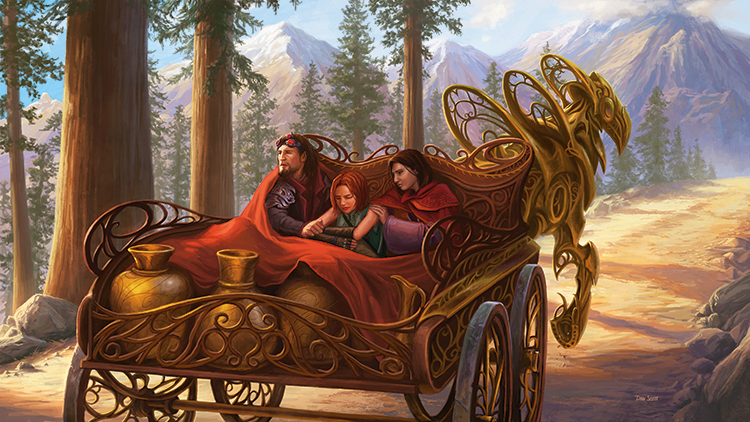
Art by Dan Scott
The villages had no names. Dirt roads replaced the mobile mosaic courtyards of Ghirapur. Thatched roofs replaced rotating towers. Bent-over field laborers replaced stirring portraits of inventor-heroes. A simple shift dress and sandals replaced Chandra’s tunic and boots. Even her identity was replaced, as her parents told her to introduce herself and them with counterfeit names. They gave her a navy-blue scarf to wear over her red hair, a scarf she promptly lost.
They learned not to unpack. Chandra and her parents stayed only for a few days at a time, sometimes moving on to the next village after only a few hours’ sleep.
“How long will we be here?” Chandra asked as they arrived by cart in a new village.
“Not long,” said her father. “Our home is the road for the time being. I’d advise you to get used to it.”
“Are we having fun?” Chandra asked, half-jokingly.
“It’s an adventure, yes,” her father said in a flat voice.
Whenever her family drove over a rise, Chandra looked back at the city, comparing the distance to the last time she could see the skyline. Every time she looked, the vivid structures paled, the sharp spires and bright copper domes of the city swallowed up by the broad shapes of the mountain range around it. She would scan her father’s face at these times, searching for some kind of confirmation that this wasn’t hard on him, that it hadn’t crushed his spirit to be away from his little forge and his projects. She was adapting to this time on the road, even enjoying it, but she believed in her heart that this journey was all because of her, because of the trouble she had caused.
She spent her days roaming the villages and their surrounding woods, chasing peckingbirds from their coops and exploring the elevated paths of intertwined tree branches. The villagers had smiles worn into their faces, and they nodded to her and let her be. Her mother said that rules were only words used by people who wanted something, and these people wanted nothing from her, so she wallowed in freedom. She collected seeds and heavy fruit and other gifts from the woods, and left them at village doorsteps. She thought about her fire sometimes, but she did not seek it out, and it didn’t show itself. She thought of her power like one of her discarded devices back in Ghirapur—unfinished, unmastered, and abandoned.
On a bright day when she had thought nothing of fire and almost nothing of soldiers, she found a treasure in the trees. A huge, corrugated horn jutted from between two heavy branches. It curved in a sinuous shape, with striations that would hold paint nicely—a fine gift for someone in the village. She climbed up to the prize and wrested it free, letting the horn fall to the earth.
When she hopped down to the ground, a herd of furred beasts surprised her. Their horns matched the one she had found—she was clearly in their territory. Their snouty lips pulled back to reveal tusks meant for tearing flesh. They bellowed in her face.
She bellowed in theirs.
Her fire came readily, without thinking, as natural as the impulse to run. She carved handfuls of fire as she ran, cupping her hands as if she were grabbing clay out of the air, grazing the beasts’ faces with it and cutting off their paths. She threw flame without hesitation, without burning her sleeves, without trying. There was no negotiation with the fire this time. She needed it and it came to her.
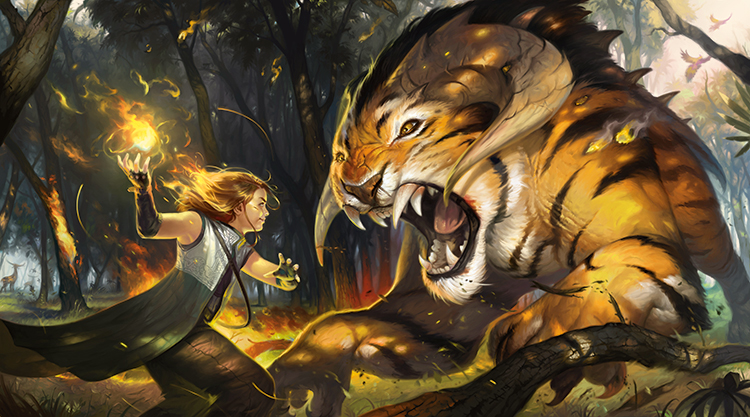
Art by Victor Adame Minguez
The beasts dispersed with only singed fur or superficial burns, leaving Chandra alone with her heaving breaths and the glow in her cheeks. She found a trail and walked back to the village, clasping her hands together with a secret smile on her face. She didn’t tell her parents she had almost been gored to death by a herd of woodland creatures, but they pointed out that she had barely eaten anything at dinner. She couldn’t, not with the excitement making little explosions in her stomach.
That night she tossed and turned on her cot, unable to sleep. She traced a finger down the lines of one palm, feeling the contours of the bones in her hand, then switched hands and traced lines on the other. There was something in her that no one else shared, something that left her breathless, like painting still lifes or delivering canisters never could. She lay awake for hours, imagining a moth fluttering around inside her chest—a moth made of fire, burning but not consumed.
A candle in a filigree enclosure cast elaborate shadows around the walls of Captain Baral’s office. A messenger in uniform entered, touching her fist to her chest in salute. Captain Baral looked up from his desk.
“Report, soldier,” said the captain in his low rasp.
“We have word from one of our scouts, sir,” said the messenger.
“They’ve seen her?”
“All the three of them. The Nalaars have fled the city.”
“You have a location?”
“Only an approximate one. They’re hiding out in the outskirts, moving from village to village. Whirlers have caught sight of them once or twice.”
Captain Baral’s mouth twisted. “Return to me when you have specifics. You’re released.”
“But…sir? There’s something else.”
Captain Baral just raised his eyebrows at her.
She placed a missive marked with an official stamp on the desk. “Sir, the consuls recommend that we cease the search. Their missive claims we’re expending large amounts of Æther to track the Nalaars. Sir, we’ll be sure to apprehend them if they attempt to return to Ghirapur. The consuls just don’t consider them worth the resources to pursue them.”
“This is not about a couple of fugitives, soldier,” said the captain, not raising his voice above an even whisper. “It’s about the future. We need to show the people of this city that we’re prepared to move beyond the barbaric age of the past, to embrace progress. The girl is a remnant of a chaotic time. An obstacle. If we’re going to move forward, we’ll need our path to be clear. The consuls will understand that.”
“Yes, sir,” said the messenger. “We’ll find them.”
“Good. I want a skyship and a detachment of soldiers at the ready.”
The messenger hesitated. “Sir? Are we prepared for a fight, should we encounter them? The girl’s fire magic—it’s powerful.”
“We have nothing to fear from her, for we are members of an enlightened society of builders and creators.” Baral reached for the filigree cage on his desk that contained a small taper, and opened a little door in the cage. The shadow of his hand loomed across the walls. Baral didn’t touch the flame, but only held his hand near it. The flame dimmed and went out, leaving a sinuous line of smoke. “We know that fire never creates—it only destroys. Ultimately it will bring nothing but ruin to its wielder.”
“You wanted to see me?” Chandra asked, entering the modest dwelling in their latest host village.
“Come in,” said her father, patting a wooden bench. “Sit down.”
Chandra brushed dust off of her tunic instead of sitting. “Wait. Is this your ‘We have to have a serious talk about your behavior, young lady’ voice? Or is it ‘I want you to know I’ll always be there for you, darling daughter’ voice? I can’t tell.”
“Always the latter. Today, a bit of the former as well. Sit.”
Chandra sat. “Is this ‘We found out you set some stuff on fire, and that’s bad?’”
“Using your gift is never bad,” her father said. “It’s what’s special about you, and that will always be a good thing. It’s just that…not everyone sees it that way.”
“Is this about the beasts? Who told?”
“It’s just that some of the people in this village—they rely on the animals of the forest to survive. They’re helping us hide out, because they don’t get along with the consuls.”
“The consuls’ forces. They’re who’re after us.”
“That’s right. The people here are volunteering to keep us safe. So when we’re out here, we’re their guests. We have to play by their rules.”
“Mother says there are no rules out here.”
“I’m not sure you’re quite capturing her position. We owe our hosts a lot for their generosity. We must use our gifts in ways that don’t interfere with their lives.”
“It’s fire. What’s the point of saying it’s good if it’s against everybody’s rules?”
“You just have to be more careful. I have something for you, something that should help.” Her father handed her a small mechanism. It was a finely-etched metal box with vents on one side. It had a shoulder strap and a flexible cable that led into it.
Chandra turned it over in her hands. “What is it?”
“It’s called a vent pack. It’s based on an old invention from long ago. Your mother and I made this for you.”
“Should I be greeting this with skepticism? Because I am.”
“Try it on.”
Chandra stood and looped the strap over her shoulder. The vent pack settled in the small of her back. Her father touched the loose end of the cable to a spot of bare skin near her shoulder blade, and it adhered to her skin.
“What does it do? It’s heavy.” She twisted around to look at it. The metal of it felt cold through her shirt. And at the place where the cable met her skin, she felt a slight electrical charge.
Her father put his hand to his chin and regarded her. “Now some bad news. I’m afraid you can’t go back into the woods again. Ever.”
Chandra whirled on him. “What? Why?”
The pack hissed, venting a quantity of steam.
“Test successful,” her father said.
Chandra narrowed her eyes. “Skepticism turning to outright distrust, dear father.”
“I’m sorry. The vent pack converts excess energy into steam. The design is usually used for safely offloading surplus power in Æther collectors. In your case, your temper is an energy source. It feeds your gift. And this will help you control it.”
Chandra frowned. “So when I wear this, I won't be able to produce fire?”
“It should dampen your gift so that it will only manifest in a safer form. It won’t go off when you don’t want it to. And you’ll wear it all the time now.”
The vent pack hissed. She thought of the image of the fluttering fire moth, but now imagined it enclosed inside the vent pack, choking and dissipating into smoke. Maybe fire magic was something no one was supposed to enjoy. She felt suddenly childish.
Her father squeezed her arm. “This is for your own good, and for the safety of our village hosts.”
Chandra sighed and collapsed back down. “Father. Us being out here. Is it because of me? Because of what I did at the Foundry?”
“Chandra, listen to me.” Her father put his arms around her. “Your mother and I are very proud of the person you’re becoming. You’re the most important thing in the world to us. We want you to know that everything we do, we do to keep you safe, and to make the world a better place for our family. Nothing else matters.”
Her father broke the hug. She looked up at him, and his smile was warm and real. The metal corner of the vent pack poked into her back uncomfortably, but she held back and didn’t remark.
The day the soldiers surrounded the village, Chandra was exploring in the woods, her vent pack tapping against her back as she walked. She didn’t notice them approaching the homes, didn’t even hear the skyship descending. It was only when she heard the shouting that she ran back to the village and saw them.
They wore the same uniforms as those who had stopped her in the restricted corridor back in Ghirapur. Weapons were affixed to their forearms, and many of them carried lit lanterns, despite it being the middle of the day. One of them was tall and confident, and spoke to the others in a hoarse whisper. Captain Baral. Somehow he had found them.
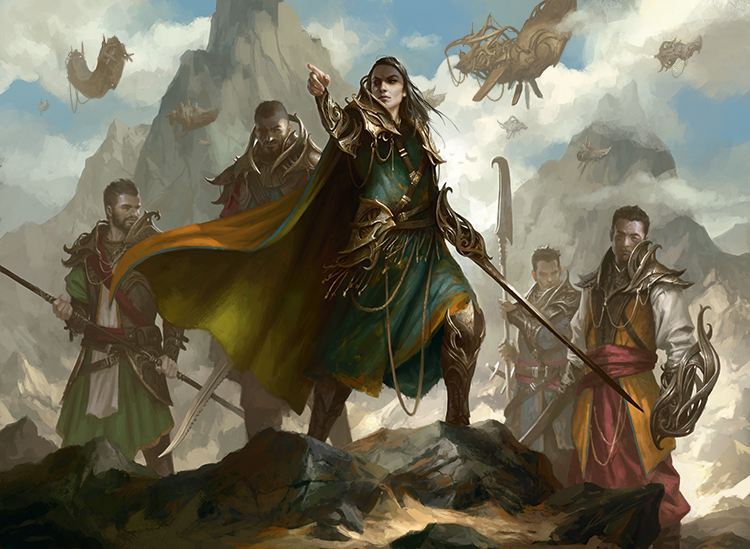
Art by Daarken
The soldiers created a human fence around the village, crossing their arms and displaying their snapblades. One woman from the village shouted at them, and at Captain Baral’s order, the soldiers shoved her back.
Chandra’s vent pack gave a puff of steam. She stamped out of the woods at them. “Hey!” she shouted. “You looking for me? If you want me, here I am!”
The soldiers looked at each other. “It’s the Nalaar girl.”
“My name,” she said, standing up to chest-height, “is Chandra. Leave these people alone. They’ve done nothing wrong. Take me.”
“We will take you,” said Captain Baral. She had forgotten the way his low voice sounded like stones being ground to dust. “Because you and yours are a danger to yourselves and to the public.” He turned to the woman and the other villagers. “You may go.”
The villagers moved away, the adults ushering the children into their homes. Chandra scanned for her parents, but couldn't see them among the crowd.
“I'm not a danger,” she said. “Not anymore.” She swung her vent pack around for Baral to see. A constant trail of steam curled out of its vents.
“Your very existence is a danger,” Baral whispered. “Do you know how we found you, child? These people finally gave you up.”
“That’s a lie. My parents said they were keeping us safe.”
“Your parents’ crimes are many, but your crimes are far worse, pyromancer. You’re an instrument of chaos and death. How many people have you killed?”
“No one. I just broke some of your mass-produced toys.”
Baral’s mouth curled up at one edge, revealing his teeth. “That’s not what I heard. I heard you were responsible for dozens of deaths, in this very village.” He nodded to the other soldiers. “Do it.”
The soldiers used their lanterns to light the thatched roofs of the village buildings. They caught fire immediately, spewing thick, ugly smoke.
“No!” Impulsively, Chandra extended her arms to blast them with fire, but nothing emerged. Steam sizzled from her vent pack. Baral smiled, and something glimmered in his eyes.
“Chandra!” Her father came running from around the building. “Chandra, run! This way!” He hurled a small copper orb onto the ground at the soldiers’ feet. It exploded in a blast of light, spraying their faces with glimmering motes. They moaned and clapped their hands over their eyes.
Chandra ran into the village, her father close behind. She raced between the dwellings of the village, now consumed with fire and screams. Smoke rolled through the dirt pathways, cloaking the way back to the building where her family had been staying. She barreled ahead, trying to keep an eye on where her father was.
When she emerged from the smoke, she was on the opposite side of the village. Fire blazed tall, consuming entire buildings. People staggered out of the village, shrieking, rolling in the dirt to put themselves out. Baral’s soldiers stood by, doing nothing to help the victims. This would be blamed on her, she realized. She was the one who scared the woodland beasts with her fire, and so some villager must have contacted Captain Baral. And now all this fiery death would be on her hands, because she was the pyromancer. She had been tricked so easily, and Baral had all but stated it right to her face.
The soldiers caught sight of her. She turned to run the other way, but she slipped on something and fell. Her foot had caught on a slippery piece of fabric, trampled in the dirt. She took it in her hands. It was her mother's shawl, the one she always wore around her, with its characteristic embroidery. It was smoking and singed from fire. She realized she was in front of the dwelling where they were staying, and it was consumed in fire.
“Mother!” she yelled, suddenly unable to get up and run again. “No!”
The soldiers deployed the razor-sharp blades at their forearms. They parted to let Captain Baral approach her. He had a simple dagger in his hand, and towered over her. She couldn’t force herself to move.
“The arena will have an excellent show,” whispered Baral. “The consuls enjoy making an example of dissidents. And the crowds enjoy shows of force, when it doesn’t involve them.”
Her father appeared out of the village smoke. He shoved himself between them, wedging himself between Chandra and the soldiers. “Enough,” he said, coughing. “Take me. I’m the one you want. I yield.”
Baral approached her father, put one hand on his shoulder, and stabbed him through the gut with a dagger. Her father gasped and crumpled, falling to his knees, holding his stomach in his hands. He glanced at Chandra for a moment, and she saw his last emotion in his eyes—not fear, but disappointment that he couldn’t do better for her. He bent over, shuddering, and fell to the ground.
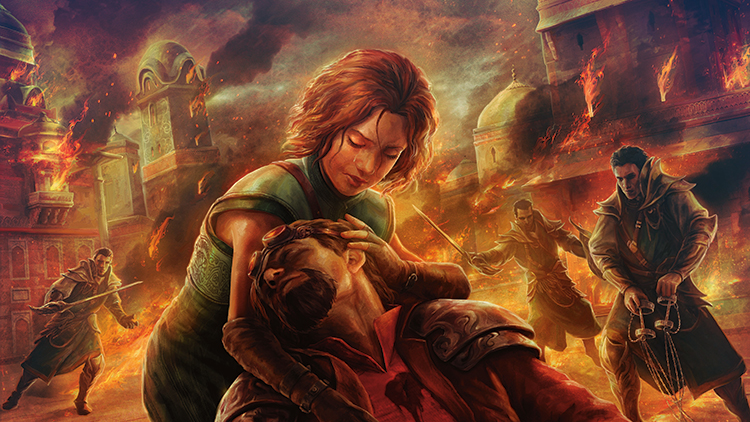
Art by Jason A. Engle
Chandra didn’t hear the sound she made at that moment. The world became enveloped in steam and smoke, and the uniforms of soldiers. She didn’t feel the clink of cuffs around her wrists, the dainty loops of copper filigree that held like heavy iron. She didn’t feel the vent pack blasting steam. She didn’t feel herself being walked to the skyship, stepping over the threshold and put in her seat, gripping her mother’s shawl. And she didn't see the plumes of smoke trailing away from the village as the skyship rose and turned its nose around toward Ghirapur. She only saw her father crumpling down into the mud, over and over again, and heard the disheartened sigh of his final breath leaking out of him.
The executioner was tall and broad; his face was hidden by a hood with a filigree mask. More relevant to Chandra's situation was that his forearm ended in a massive cutting blade. It may have been fitted over a hand, but to Chandra it looked grafted on, fused into the entire deadly costume of the executioner’s role. He walked in a circle around Chandra, tracing the perimeter of the central dais of the arena. It was the Akhara, the same courtyard Chandra had cut across when making her failed delivery only a few weeks ago. Now the stands were filled with people gathered to watch the grim spectacle.
She looked down at the delicate cuffs that held her wrists firmly in place. Her hands didn’t look like the weapons of a pyromancer, but like an ordinary child’s hands.
A squat announcer in a silk robe read her sentence in a booming voice. “For crimes against the public good, destruction of the honored Foundry of Ghirapur, and for the deaths of three people in the fire in the village of Bunarat, this citizen has been sentenced to meet the blade of justice.”
As he read, Chandra tried to muster her fire. But it didn’t come to her. She could feel something pressing down on her, dulling any fire she could muster. She still wore the vent pack on her back, now resting just above her mother’s shawl. The pack wasn’t hissing. Her rage was gone, along with her father. Chandra scanned the crowd for any sign of her mother—if she were alive, she would doubtless be here, trying to stop this, trying to save her daughter. But nothing stopped the announcer’s speech, which made it clear to Chandra. Her mother must be dead as well.
She had nothing left. Maybe it was only right that the executioner take her life.
“Today we all learn a difficult lesson about the limits of compassion and the importance of vigilance,” the announcer continued. “Today we learn that, for some, no amount of direction, no amount of moral guidance, can be enough. Some are born with destruction built into them, and for the good of us all, these must be eliminated.”
Maybe she wasn’t meant to go on. Maybe she was never meant to be the best at anything. Maybe she was just a freak after all, a monster with a “gift” that could only cause those around her pain. Maybe no one could trust her, could love her for who she was. Maybe she should just lower her head and accept her fate.
Something in the crowd caught her eye. It was Mrs. Pashiri, her contact from the foundry. Mrs. Pashiri nodded to her from the crowd, her mouth a thin, taut line, her eyes glazed with defiant tears. Slowly, Mrs. Pashiri raised her hand. Her fingers closed into a circle by her forehead—the Nalaar signal, like a pantomime of her father’s welding goggles, performed like a salute.
Chandra’s fists squeezed. The vent pack hissed, then whistled like a tea kettle. She kept her eyes held on Mrs. Pashiri, that gesture, that respect for who she was. She was a Nalaar. She was Chandra Nalaar.
“This citizen’s continued existence endangers us all,” said the announcer. “So for the sake of us all, she meets the demands of justice. Bladebearer, please step forward.”
As the executioner took three ritualized steps toward Chandra, the blade slid out from his arm, doubling its deadly length. Chandra’s whole body tensed. The vent pack’s whistling turned to a sputter as something boiled within her.
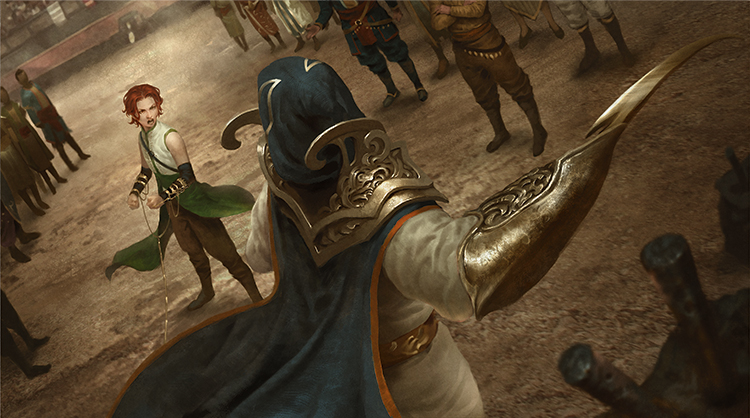
Art by Lius Lasahido
The executioner leaned his masked face close to Chandra’s. “I know you’re trying, pyromancer,” he said in a gravelly whisper.
Chandra tore her eyes away from Mrs. Pashiri and looked directly into his mask, her teeth gritted. She knew the voice instantly. “Baral.”
She could see Baral’s eyes through the filigree of the mask, and his glare was utterly cold. She could feel the weight of his presence on her, the pressure of his antimagic.
“You and I aren’t the only mages this world has seen,” he whispered. “But I’ll be the last you’ll ever know.” He tilted back from her slowly, letting the blade swing out and up for all the crowd to see.
Chandra focused on Mrs. Pashiri in the crowd. The old lady never lowered her hand. Chandra’s wrists strained at the restraints, but she couldn’t move. This was her final moment.
Baral raised the blade high. Chandra heard the announcer give the order: “Swing.”
Every one of her muscles tensed. She reached inside, grasping for something, anything—and she found the fiery moth, its bright wings fluttering. It was a tiny but rebellious source of light, undeterred, undoused. It was her, she realized—a manifestation of her gift, but also a manifestation of herself. She was her fire, and her fire was her. She felt a tiny part of what it meant to be a pyromancer, what it meant to be alive, what it meant to be Chandra.
In a slow instant, the blade arced down through the air toward her neck. Chandra felt the prickling sensation wash over her like a wave of coals. Her vision flickered at the edges, blurring out Baral and the announcer and everything around her. The arena and the crowd warped in a molten haze. She felt the sputtering steam from her vent pack turn to white-hot liquid, barely aware that the pack had melted into slag, and was dripping down her leg and burning through the stone dais.
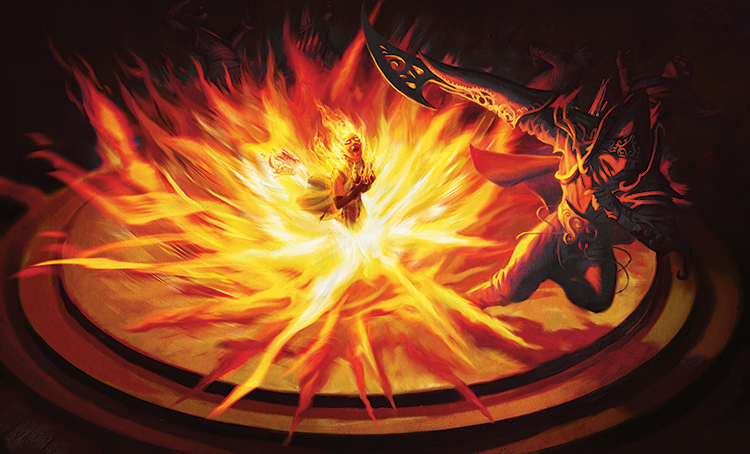
Art by Eric Deschamps
Her hands caught fire, flash-melting the restraints. Her arms caught fire. Her shoulders and torso caught fire. She turned her face away, but the flame spread up her face. Her hair became a blaze of incandescence. Her eyes roasted, becoming red-hot orbs in their sockets.
She uttered a scream of fury, and the scream became an explosion. A cascade of fire blasted out from her, enveloping the dais, enveloping her captors, enveloping the entire world. Everything she could perceive was bathed in fire.
She held her flaming arms over her flaming head, and squeezed her flaming eyes shut tight. Her ears rang, deafened and roaring at once. A moment or an eternity passed. One moment she thought she heard the screams of Baral, and the next she had the sensation of being blown out like a candle, or of rushing through a tornado and coming out the other side.
When she opened her eyes, the smoke from her blast still cloaked the world around her. Her clothes fumed, and her vent pack was gone. When she heard voices of people approaching her, she readied more fire, preparing to throw it at her captors once again. The fire came to her readily, like a trusted ally.
The smoke cleared enough for her to see the people who approached her. They didn’t look like consuls’ enforcers, or like anyone she had ever known: tall and noble, robed like monks, with ash streaked on their faces like ornate masks. Behind them rose a hilltop of roughly sculpted rock, with stairs leading up to a monumental archway leading into the mountain. Craggy stone architecture bloomed from the mountain, lit by brazierless trails of fire, and the air smelled of hot gases and baking earth.
The arena was nowhere to be found. The entire city, her entire world had abandoned her—or she had abandoned it.
Chandra sputtered in terror. The monks reached out their hands to her in a calming gesture, and one of them said something in a soothing tone.
So she summoned up her will and blasted all of them with fire. Fire logic.
Somehow, though, the raging funnel of flame did not harm them. One of the monks raised his hand and her fire subsided, attenuating and becoming a warm glowing ring that encircled her and them together. The monk nodded to her.
“Greetings, pyromancer,” said the monk. “You are welcome here.”
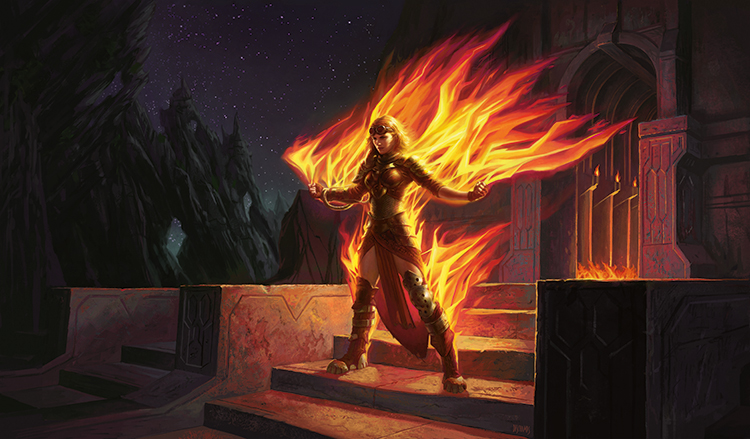
Art by Eric Deschamps

